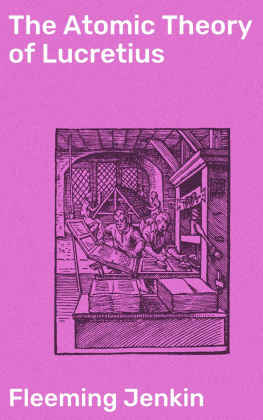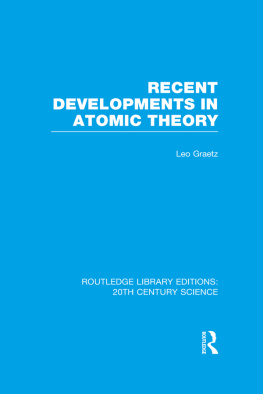I know not whether this inquiry I speak of concerning the first condition of seeds or atoms be not the most useful of all."BACON.
THE popular conception of any philosophical doctrine is necessarily imperfect, and very generally unjust. Lucretius is often alluded to as an atheistical writer, who held the silly opinion that the universe was the result of a fortuitous concourse of atoms readers are asked to consider how long letters must be shaken in a bag before a complete annotated edition of Shakespeare could result from the process; and after being reminded how much more complex the universe is than the works of Shakespeare, they are expected to hold Lucretius, with his teachers and his followers, in derision. A nickname which sticks has generally some truth in it, and so has the above view, but it would be unjust to form our judgment of a man from his nickname alone, and we may profitably consider what the real tenets of Lucretius were, especially now that men of science are beginning, after a long pause in the inquiry, once more eagerly to attempt some explanation of the ultimate constitution of matter.
This problem, a favourite one with many great men, has come to be looked upon by most persons as insoluble nay, the attempt to solve it is sometimes treated as impious; but knowing that all the phenomena of light are explained by particular motions of a medium constituted according to simple laws, and so perfectly explained that the exact motions corresponding to all the colours of the spectrum, with their modifications due to reflection, refraction, and polarization, can be defined in form, speed, and magnitudeknowing this, we may reasonably expect that the other complex attributes of inorganic matter may be deduced from some simple theory, involving only as an assumption the existence of some original material possessing properties far less complex than those of the gross matter apparent to our senses. It is only in this sense that we can hope ever to understand the ultimate constitution of matter; but as the undulatory theory of light has both suggested the discovery of new facts, and has connected all known facts concerning light into one intelligible series of logical deductions, so any true theory of the constitution of matter would suggest new inquiries, and would group the apparently disjointed fragments of knowledge, now called the various branches of science, into one intelligible whole. To frame some such theory as this was the first aim of Greek philosophers, and to establish the true theory will be the greatest triumph of modern science. Of all the [212] subtle guesses made by the Greeks at this enigma, one only, we think, has been fruitful, and that the one expounded by Lucretius, but learnt by him from Epicurus, who in his turn seems to have derived his most valuable conceptions from Democritus and Leucippus. As, however, we possess fragments only of these earlier writers, it is convenient to speak of the theory as that of Lucretius, though he seems to have been simply the eloquent and clear expounder of a doctrine wholly invented by others.
Before explaining how far the views of Lucretius are still held by naturalists, and how far they contain the germs of many modern theories, we must endeavour to give a clear account of what his views really were, in which attempt we shall be much aided by the admirable edition and translation of his works by Mr. Munro.[1]
The principles of the atomic theory are all contained in the first two books attention being generally called in the original to each new proposition by a "nunc age" or some such expression. Lucretius begins by stating that " nothing is ever begotten of nothing." To this principle, which is assumed as true in all physical treatises of the present day, he unnecessarily adds, that this is not done even by divine power, about which he could know nothing. Lucretius felt little reverence for the Pagan divinities, and states this principle so roundly as at first to shock our feelings but if we limit the application of the principle to matter once created, and such as we can observe, his principle is true, and invariably acted upon. Not even by divine power is matter now created out of nothingnor does any effect happen without what we call a natural cause. Lucretius seizes the opportunity of stating that men think things are done by divine power because they do not understand how they happen, whereas he will show how all things are done without the hand of the godsa bold proposition truly, but one which, translated into modern language, means simply that natural phenomena are subject to definite laws, and are not unintelligible miracles. Lucretius fails to perceive that definite physical laws are consistent with the work of God and the difficulty of reconciling the two ideas, unreal as it seems to us, has been felt by able men even now-a- days, when the conception of divine power is very different from any present to the mind of Lucretius. To most of us the very conception of a law suggests a lawgiver, while he, to prove the existence of laws, thought it necessary to deny the action of beings who could set those laws at nought. The demonstration [213] which he gives of his first principle is loose, and goes rather to establish the fact that natural phenomena occur according to definite rules than to prove that no matter is created out of nothing, except in so far as this creation would, he thinks, disturb the order of nature. This first principle, as to the creation of matter, cannot indeed be otherwise than loosely stated by Lucretius, for no definition is given of what should measure the quantity of matter,[2] and until we have defined how this quantity is to be measured, we cannot experimentally determine whether matter is being created or not. But Lucretius meant his proposition to include the statement that nothing happens without a cause, and without a material cause, and his proof of this is precisely that which we should still adduce, being the perfect regularity with which in nature similar effects follow similar causes.
The next proposition is, that " nothing is ever annihilated, but simply dissolved into its first bodies," or, as we should say, components. This statement is complementary to the first. Together, the two propositions affirm that constancy in the total quantity of matter which is a commonplace truth now, but which to Lucretius must have been unsupported by any rigorous proof. His own arguments in support of the law go no further than to show that we have no proof of the destruction of any portion of matter. He shows that rain when it falls is not lost, but produces leaves and trees, that " by them in turn our race and the race of wild beasts is fed" but he makes no effort to measure accurately the quantity of matter apparently disappearing, but reappearing in the new form, and without that measurement his proposition could not be rigorously proved moreover, in the mind of Lucretius, the indestructibility referred to all kinds of causes, so that, to make our proposition co-extensive with his, we must interpret it to mean that matter is indestructible, and that no cause fails to produce an equivalent effect, though Lucretius probably did not conceive these two parts of his proposition separate one from the other.
Occasion is taken at this point to state that the components into which bodies are resolved, or out of which they are built, may be invisible. The third distinct proposition states that " all things are not on all sides jammed together and kept in by body : there is also void in things." Lucretius thought that, in order to explain the properties of matter, it was absolutely necessary to admit the existence of vacuum, or empty space containing nothing whatever. If there were not void, he says, things could not move at all ! And it does seem, at first sight, that in a universe absolutely full, like a barrel full of herrings, [214] so shaped as to leave not a cranny between them, no motion whatever would be possible but reflection shows us that what is called re-entering motion is possible, even under those circumstances, provided we do not suppose our fish to stick to one another there may be an eddy in which the fish swim round and round one after the other, without leaving any vacant space between them or on either side, and yet without enlarging, diminishing, or disturbing the barrel as they move.[3] Lucretius either failed to perceive this, or declined to admit the possibility that all the movements of gross matter could be of this class but he has another argument in favour of a vacuum : " Why do we see one thing surpass another in weight, though not larger in size ? " How can things be of various densities unless we admit empty pores in bodies ? His proof is insufficient but here again modern research has confirmed his conclusion, so far as it affects gross matter only, and Lucretius conceived no other. His explanation of varying density is that which is universally received and taught, and even the modern disbelievers in a vacuum do not deny that some space may be unoccupied by gross matter, but simply affirm, on grounds to be hereafter stated, that all space is full of something, though not of ponderable matter. In support of his proposition, Lucretius points to the pores found in all bodies, and uses the following ingenious though fallacious argument to prove a vacuum ::" If two broad bodies after contact quickly spring asunder, the air must surely fill all the void which is formed between the bodies. Well, however rapidly it stream together with swift circling currents, yet the whole space will not be able to be filled up in one moment; for it must occupy first one spot, and then another, until the whole is taken up" therefore in the middle a void must have existed for a sensible time.













